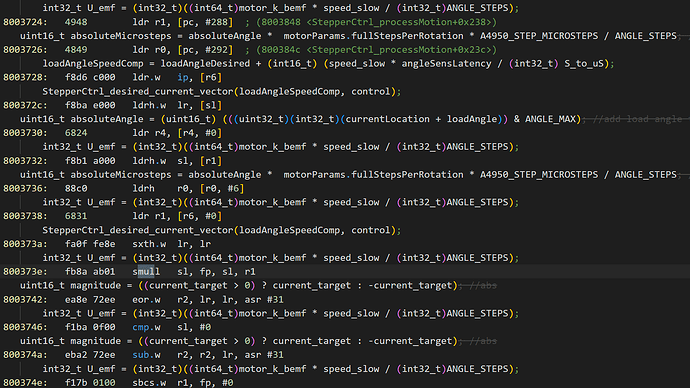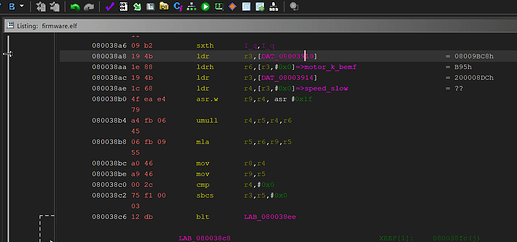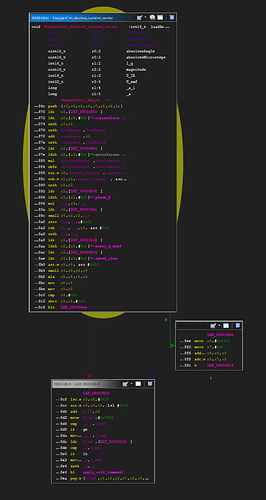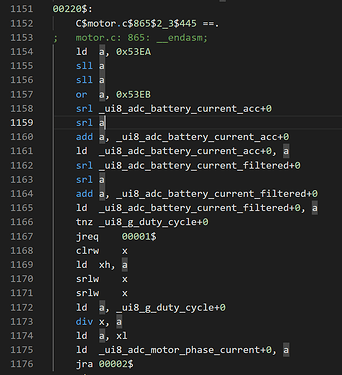I spent an hour to understand how I can save assembler “.S” files during building.
Probably, I don’t know the place where will be saved.
I tried next:
[env:uno]
platform = atmelavr
board = uno
framework = arduino
build_flags =
-save-temps
but can’t find files.
I found filed in the root of the project but they don’t contain something useful. As I can see there is only string tables, I suppose debug table
CLion + macOs
Source:
#include <Arduino.h>
void setup() {
pinMode(LED_BUILTIN, OUTPUT);
}
void loop() {
digitalWrite(LED_BUILTIN, HIGH);
delay(1000);
digitalWrite(LED_BUILTIN, LOW);
delay(100);
}
S file
.file "main__.cpp"
__SP_H__ = 0x3e
__SP_L__ = 0x3d
__SREG__ = 0x3f
__tmp_reg__ = 0
__zero_reg__ = 1
.section .gnu.lto_.profile.293fb85e1d98b8c9,"",@progbits
.string "x\234cc```\001bF\006\007A"
.string "\001\t"
.ascii "]"
.text
.section .gnu.lto_.icf.293fb85e1d98b8c9,"",@progbits
.string "x\234cc``\340e@"
.string "&\206m7\366\3723n\355\375\373\224\217\001"
.ascii ")N\005\343"
.text
.section .gnu.lto_.jmpfuncs.293fb85e1d98b8c9,"",@progbits
.string "x\234cc``\270\303\200"
.string "L@\314\3028\205\231\361\303\316\245+\230\272\231\347030\3622nf\224a`<\300\310\310\013\304\f\f \351\255\355g6rA\244\031\031\267@\245\031!\322@S@JN-\376v\210\025\244\204\221\361\t\003\343V\250\232'\f`E,\214X\f\235\326z\350<;\304P\006\306mPi\210z\260\211sgL\374\313\t1\361\005;\343v\250\202\027\3548LDs\027\003"
.ascii "\2077.\332"
.text
.section .gnu.lto_.inline.293fb85e1d98b8c9,"",@progbits
.string "x\234cc``pg@"
.string "&\006\0066>F\020\305\300\266@\036D10\363\200\205\031\031\370\2150%\030a\322(\034\006"
.ascii "z\373\002\215"
.text
.section .gnu.lto_.pureconst.293fb85e1d98b8c9,"",@progbits
.string "x\234cc```\005b&\006\tF\t"
.string ""
.string "\364"
.ascii "?"
.text
.section .gnu.lto_setup.293fb85e1d98b8c9,"",@progbits
.ascii "x\234%\215\261KBa\024\305\317\371\256>\037\201\212s\376\003\022"
.ascii "\344\237\323(\341\324`\210\375\001\357\253\320g\344\020T\272"
.ascii "\274\301\206\320-D-\336\366\341,\r\256m\rM\022\r\256Y\367\323"
.ascii "\003?8\234{\357\271\001\200\245RR\016\025\nh\356\336\201\313"
.ascii "\320\220\336\330\220\210\f#\366\344A\270\210\277RS\031Y\225\033"
.ascii "trv\354\230\b\320W\2748e\005\272\3669\331>\346\203\314>\347\214"
.ascii "\001\250\346e\225uv\373\027[\267y\342\221\216\272\212\376\260"
.ascii "\0167b\274\273vX\263=\274/\354n\264(M\327\037\271\350\327\206"
.ascii "\211\260/Z\3029#?\370I\237\307\346V\0221\314\363\225e\215\346"
.ascii "\361rr\260\217\3107\226\023\021|\363jx\262+\363\352j\203~1@\361"
.ascii "\242U\2576N\317\316k\265\343z\263\211\177\2633H8"
.text
.section .gnu.lto_loop.293fb85e1d98b8c9,"",@progbits
.ascii "x\234}\220=K\003A\020\206\347\335\275/\205 \326\346\017\244\321"
.ascii "\237\024$\225\205\022\364\007\334\372\021\222\240\205\202\236"
.ascii "\026'\234\210\230N\202F=?\340H%\"*\266v**xDA\260Kt\366V\260\221"
.ascii "\f\f;\314\354\373>\3038DT\007\3210\277#\234\220\004\261|M4\353"
.ascii "\t@\027\312\003\371\002>\226\344\252D\273\372\034\213\302\256"
.ascii "\342H\326;\216j$\b%Q\300\251\003\373(\020\177{h\366\326r\216"
.ascii "e\3728\200C\314\240\275;;Q\275\357\252J\322-\304\226CT\3439C"
.ascii "TBu)t5\237P\212J\364x!2\025[\305qz\357\372]\345\205\022\201d"
.ascii "\033\264\340\353\301G\274\323\020\2132\224\0029\034\"\317\255"
.ascii "V\365\2529hZ\300\021\362\241\224l\267\020\275\334\342\037;+`"
.ascii "&\341\330\330mn\254t\007\264\326\306\253\213X\213\235l\227\267"
.ascii "~\273\234\260\370\027\036T\3327\256\201\023N\377\340\357\375"
.ascii "\340g\006~\271\375\325\266\r\374\211pn\340\035\314E\237^\246"
.ascii "\325Qc _\210UC3\323\245\261\311\361\211\251bq\264T.\323\017\240"
.ascii "\254\206O"
.text
.section .gnu.lto_.symbol_nodes.293fb85e1d98b8c9,"",@progbits
.ascii "x\234U\310\301\021@0\030D\341\267IF]T\366\007)@\021\252pvV\003"
.ascii "3\352\bar\340\260\363f\277\006\350\313p\031\203i\343\311\022"
.ascii "\273\"\027\246\237h\220\271W \306\266@\222\371\037\214\262\360"
.ascii "\005\217c\336\263\274B\255g\255\377\254?\035Y\334b\372\"\032"
.text
.section .gnu.lto_.refs.293fb85e1d98b8c9,"",@progbits
.string "x\234cc```\004b\006"
.string ""
.string "D"
.ascii "\b"
.text
.section .gnu.lto_.decls.293fb85e1d98b8c9,"",@progbits
.ascii "x\234\215SOH\024Q\030\177\337<Wm\\3\"\302\303\036\242\213\206"
.ascii "\270St\361\026\321\241Ku\b\244K\240\303\356fK\353\3166;\026\326"
.ascii "\241\207%\225z\b\214\n\2424\202\312\254LK\323\362\317Zk\226\245"
.ascii "\225htP\324\n<hTx\020\363`\337{\363\306]\313\240\307|\363\315"
.ascii "{\337\367\3733\357\315\244\022BrR\bY\300\034\303X\302A1\367b"
.ascii "(\030\035\274N"
.string "\354\341\302\350\302\350\301\210c\274\302\030 \177\217\223@\bR\222b\214A\311\361B\326\024\311\021_\005w\nqi\253\340\206\244\207~\331G\245\207\001\351\341\317q\221BS\345\327\206\364j\n\036\025\226\200\317g;\0262\3559/\267\314L\325dRE<\277k\272\331\243z\3571{\244o!\320\n\324\341i\250\273\023\317\244\036\336\250|o\\\250M\203\\\365\026\357\213M\217\354\230\252dL\201\016P\341\tPh\003/bP\001\357\347\030\253`\261zF\263\tl\367\300V\017\201v\310\0255x\f\036x\004\270\202@T`\r\267G\350\004\214\003\272\001\333?\200L \302\236\203\230b\266\373\234%\260\357@\022\317\304\206\360'\305\241\023\227\314 \016Y\f\2339IA*\022\t]\366\343@q]4\255`X\341\001H2\375*eH:)\220\333|y\360|\273B\217\212\363\230\254n\232\314\310\276$6\231\261u"
.ascii "\305\033\345\036\022\350\204l\274\207SlTw_\305\330\232\315\365"
.ascii "\254~\222\305\226\256\273?2v\005A\233x\027<K\234\3103q\234\360"
.ascii "\024&P\274\0136#\262\262qf'=\013B\257}v\346\212[\262<uMr]\020"
.ascii "\024\335\t\212\356d\212\036Aqa~\264Y\24156\307\364\375\321\341"
.ascii "\314\024\3342\3615\240?\\\253\375|z,uy\255\027\304b\325\247\352"
.ascii ".\327?^\356\205x\271\347 \337.>\376d\221\242/t\024\373r\267\340"
.ascii "N\025;Cy\017\304\022\276b\362K\205\270\360t\272e\266S\245\323"
.ascii "\266\247\007\367\026\037\252B?\307\261\364\263\261\271\342_["
.ascii "\333/\324_:\3527\352\346[S\245\372\257-\225\3549\360\016\350"
.ascii "Kh\3679\332\257\204\366\265\271\253\215\031\364\233\255=\372"
.ascii "a\340\240\003\316\025`n\374u\002\374\332\001\017\bp\337\322|"
.ascii ",\013\177\317\365*(8\035\376\361\366Z\006N7\250\260\216W\353"
.ascii "\333:\024w\025\377\247\3363\346\312\026do\3617z\003\334\371 "
.ascii "\270\005\025fl\356\277\3362\227\225\334\334\277\242yH6\363\274"
.ascii "6j\372\264R=\030.*\362\372\"\021u\367\276\302M\273\362\362\266"
.ascii "m#ie\301\260UPd\355\321\n\243\0013\252\205\365\322\300\211\362"
.ascii "\250\346\215\204t\353\220a\226\006\r-\242\373\216\350%\201\250"
.ascii "f\031F\310w\030i\362u\2534\020\322\217\231\032\217`\330\027*"
.ascii "\363\007\264\250\345G2\357a\342\212\006\254\262H\326JQ\222\022"
.ascii "2\214HZ$\030\336k\370\003\373\377G\357\220\211\325\343\206y$"
.ascii "_7\375h\324\310\347r>\303\304\232\\\321v\332\231\253\372\321"
.ascii "R\271\333\037,\tZz\350\200\031\264\002\277\001\214\240x<"
.text
.section .gnu.lto_.symtab.293fb85e1d98b8c9,"",@progbits
.string "setup"
.string ""
.string ""
.string ""
.string ""
.string ""
.string ""
.string ""
.string ""
.string ""
.string ""
.string ""
.string "\275"
.string ""
.string ""
.string "loop"
.string ""
.string ""
.string ""
.string ""
.string ""
.string ""
.string ""
.string ""
.string ""
.string ""
.string ""
.string "\277"
.string ""
.string ""
.string "pinMode"
.string ""
.ascii "\002"
.string ""
.string ""
.string ""
.string ""
.string ""
.string ""
.string ""
.string ""
.string ""
.string "\304"
.string ""
.string ""
.string "delay"
.string ""
.ascii "\002"
.string ""
.string ""
.string ""
.string ""
.string ""
.string ""
.string ""
.string ""
.string ""
.string "\310"
.string ""
.string ""
.string "digitalWrite"
.string ""
.ascii "\002"
.string ""
.string ""
.string ""
.string ""
.string ""
.string ""
.string ""
.string ""
.string ""
.string "\312"
.string ""
.string ""
.text
.section .gnu.lto_.opts,"",@progbits
.string "'-fmath-errno' '-fsigned-zeros' '-ftrapping-math' '-fno-trapv' '-fno-openmp' '-fno-openacc' '-mn-flash=1' '-mmcu=avr5' '-Os' '-ffunction-sections' '-fdata-sections' '-flto' '-mn-flash=1' '-mno-skip-bug' '-fno-exceptions'"
.text
.comm __gnu_lto_v1,1,1
.comm __gnu_lto_slim,1,1
.ident "GCC: (GNU) 7.3.0"




